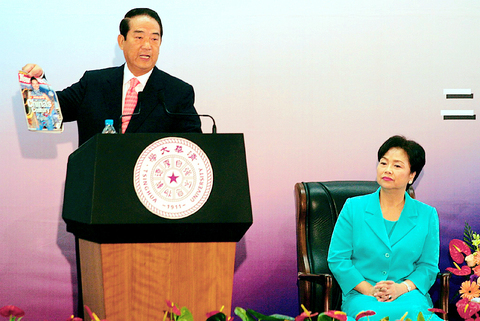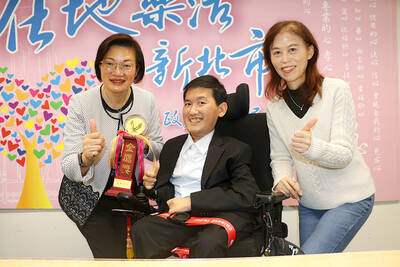The people of both Taiwan and China must work together to welcome the 21st century, People First Party (PFP) Chairman James Soong (宋楚瑜) said yesterday in a speech to university students in Beijing, while emphasizing that Taiwanese independence is not representative of the people of Taiwan.
"However large the world is, is how large the opportunity for China is. Let us together seize this chance, with our hands interlocked and hearts connected, with our feet firmly on the ground, to welcome a 21st century that is in waiting for the Chinese people of both sides [of the Taiwan Strait]," Soong said, speaking to students at Tsinghua University yesterday.
During his stop at the elite Chinese university, which was part of his scheduled agenda for a historic, nine-day tour of China, Soong spoke about the relationship between Taiwan and China.

PHOTO: EPA
Throughout his speech, Soong said that the consolidation of Taiwanese consciousness in the years of the nation's self-rule should not be equated with the Taiwanese independence movement.
Those advocating Taiwanese independence do not represent the island, Soong said.
Whereas Taiwanese consciousness is the natural result of a long passage of history and recognizes the connection between the people of Taiwan and the land, Soong said, Taiwanese independence is a plan to completely cut off Taiwan from the mainland.
"It cannot be denied; Taiwanese consciousness has been manipulated by Taiwanese independence. However, this sort of political scheme has confused the real voices of the Taiwanese people," Soong said in the speech.
Furthermore, he said, while the PFP has a strong love for its Taiwanese homeland and a sense of Taiwanese consciousness, it also has a deep bond to all the Chinese people and is adamantly against Taiwanese independence.
"Our long-standing position is that Taiwanese independence is a dead-end and has never been a feasible option for the PFP," he said.
Despite Soong's emphasis on his party's love for Taiwan, however, he made no mention of the party's, and his, often-stated support for the Republic of China in the speech, choosing to merely focus on the nation's economic success, labeling it the "Taiwan experience," and on his connection to China.
The basic way to solve the problems between China and Taiwan, is not through military means but through the common wishes of the political talent on both sides for the good of the people, Soong said. The future of both countries depends on the deepening of mutual understanding, he added.
"Only by placing the good of the people as their first priority will both sides of the Taiwan Strait exert all efforts to find a resolution acceptable to both sides. In mathematical terms, we must find the greatest common denominator of both sides," Soong said.
"Both sides are my home. On one side are my ancestors, but on the other are our descendants. No one is willing to give up one side in order to win the acknowledgement of the other," Soong said.
Soong also indirectly criticized the current administration when responding to a student's question about President Chen Shui-bian's (陳水扁) decision to decline China's offer to reduce customs duties on a number of Taiwanese agricultural products.
In answering the question, Soong said the reason the government has decided not to accept an offer that would clearly help the Taiwanese people, is because certain individuals have confused thinking and have not thought the issue through.

A strong continental cold air mass is to bring pollutants to Taiwan from tomorrow, the Ministry of Environment said today, as it issued an “orange” air quality alert for most of the country. All of Taiwan except for Hualien and Taitung counties is to be under an “orange” air quality alert tomorrow, indicating air quality that is unhealthy for sensitive groups. In China, areas from Shandong to Shanghai have been enveloped in haze since Saturday, the ministry said in a news release. Yesterday, hourly concentrations of PM2.5 in these areas ranged from 65 to 160 micrograms per cubic meter (mg/m³), and pollutants were

Taiwan’s armed forces have established response protocols for a wide range of sudden contingencies, including the “Wan Chun Plan” to protect the head of state, the Ministry of Defense (MND) said today. After US President Donald Trump on Saturday launched a series of airstrikes in Venezuela and kidnapped Venezuelan President Nicolas Maduro, concerns have been raised as to whether China would launch a similar “decapitation strike” on Taiwan. The armed forces regularly coordinate with relevant agencies and practice drills to ensure preparedness for a wide range of scenarios, Vice Minister of National Defense Hsu Szu-chien (徐斯儉) told reporters before a

EVA Airways on Saturday said that it had suspended a pilot and opened an investigation after he allegedly lost his temper and punched the first officer several times as their plane was taxiing before takeoff at Los Angeles International Airport. According to a report published on Thursday by The Reporter, the incident occurred after the flight’s Malaysian first officer tried to warn the Taiwanese pilot, surnamed Wen (文), that he was taxiing faster than the speed limit of 30 knots (55.6kph). After alerting the pilot several times without response, the first officer manually applied the brakes in accordance with standard operating

The New Taipei City Social Welfare Department on Thursday celebrated Paralympic competitor Chen Tzu-wei (張孜維), who received last year’s national Golden Eagle award for exemplary achievement by Taiwanese with disabilities. Chen, who suffers from childhood-onset muscular dystrophy, did not attend the first award ceremony held by the Ministry of Health and Welfare in November due to illness. Chen was formally presented with the award at the department, where he gave thanks to government workers for supporting his education and livelihood, the department said in a statement. Chen was raised by the Ai-hsin Home for Persons with Disabilities in the city’s Bali District (八里)